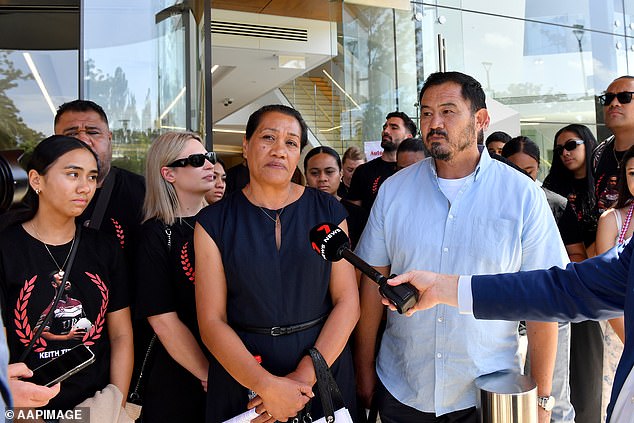Startling warning to Aussie parents as gifted star becomes youngest person to develop insidious deadly disease
- Rugby league youngster developed fatal brain condition at age 20
- Contact sports are being urged to do more to reduce head impacts
- READ MORE: AFL star’s horrific injuries revealed
A rugby player who died at the age of 20 after an “inappropriate” training session with his club in Sydney had already developed a creeping brain disease caused by repeated knocks.
In a wake-up call to all parents and players, Manly Sea Eagles junior player Keith Titmuss was diagnosed with Chronic Traumatic Encephalopathy (CTE) when he passed away from exertional heatstroke in November 2020.
An inquest heard he had become agitated and suffered multiple seizures after taking part in a two-hour training session that was ‘likely to have been inappropriate’.
After Titmuss fainted during training, paramedics were called three times to check his body temperature. They couldn’t believe that the temperature had risen to almost 42 degrees Celsius.
But doctors were even more shocked when they later discovered that the talented young athlete had already developed stage 2 CTE at such a young age.
The discovery makes Titmuss the youngest Australian athlete to date to be diagnosed with the fatal disease.
The discovery by respected neuropathologist Michael Buckland is sure to send shockwaves through the country’s leading sporting bodies and raise questions about whether they are doing enough to protect the country’s emerging athletes.
Dr Buckland told The Weekend Australian the discovery meant players were starting to develop the incurable brain disease earlier than previously thought.
Late Manly Sea Eagles player Keith Titmuss has become the youngest athlete in Australia to be diagnosed with the deadly brain disease Chronic Traumatic Encephalopathy

The competition’s rising star died after a training session at his club in Sydney
“Keith’s brain shows us that in some cases CTE starts during someone’s athletic career, and it starts at a young age,” said Dr. Buckland.
‘I actually didn’t expect to see CTE because of his age.
“This finding tells us that it doesn’t matter how well you deal with a concussion, or whether you don’t get a concussion at all. It’s that repeated exposure to large impacts, many of which don’t cause a concussion, still does subtle damage to the brain that leads to CTE.”
Unlike experienced legends such as Mario Fenech, Robbie O’Davis and Wally Lewis, Titmuss contracted the disease without ever suffering setbacks at the highest level.
It appears that playing the contact sport at junior level for fifteen years was enough to cause the fatal condition.
The Titmuss family told The Weekend Australian they hoped the discovery would serve as a warning to all contact sports that more needs to be done to reduce the number of head knocks during competition.
“This could lead to changes in the rules of the sport and therefore a reduction in our enjoyment of the sporting entertainment we love,” his parents, Lafo and Paul, told The Weekend Australian.
‘However, the rules of the game must continually evolve to prevent injuries to our athletes.
“The death of nerve cells in the brain is a serious issue that our community needs to think about and talk about.

Lafo and Paul Titmuss have called for a tougher approach to head knocks in junior sport after their talented late son was diagnosed with a fatal brain disease at the age of 20

Respected neuropathologist Michael Buckland says he was shocked by the discovery
‘We may need stricter safety measures and regulations for all sports to protect our athletes’ brains and improve their quality of life after sports.
‘Dr Michael Buckland’s research is crucial and his findings should be recognised by all sports governing bodies that have experienced incidents involving head injuries.
‘We therefore urge all sports governing bodies to take responsibility for continually reviewing their head injury regulations and preventive measures for the benefit of the quality of life of individual athletes.’
Dr. Buckland told the newspaper that Titmuss’ case shows that young people who play contact sports are at greater risk of CTE.
“He’s been exposed to it early and for a long time. I think every parent has to think very carefully about the long-term health of their child’s brain and whether the codes are doing enough,” said Dr. Buckland.
